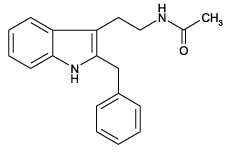melatonin

Melatonin is a hormone derived from serotonin and secreted by pinealocytes in the pineal gland and also by the retinas of vertebrates. It passes by way of the blood or through the fluid of the third ventricle to the anterior pituitary gland to control gonadotropic hormone secretion.
Melatonin secretion by the pineal is linked to the dark-light cycle of the organism's environment, being greatest at night and lowest by day. It is involved in regulating certain diurnal and seasonal changes in the body, such as the onset and timing of sleep, winter weight gain, and the reproductive cycle in seasonally breeding animals.
Melatonin also controls pigmentation changes; it triggers aggregation of the pigment melanin into melanophores in the skin, causing the skin to turn pale. Levels of melatonin decline with age.
Melatonin (5-methoxy-N-acetyltryptamine) is naturally synthesized from the amino acid tryptophan (derived from serotonin) by the enzyme 5-hydroxyindole-O-methyltransferase. It can be manufactured artificially and has shown several possible beneficial medical uses.
Despite some claims to the contrary, melatonin production and release does not necessarily decrease with age. Instead, a number of factors, including light exposure and use of some common medications can affect melatonin secretion in people of any age.
Melatonin supplements
As with other hormones, melatonin is marketed as a dietary supplement. The claims made about the effects of melatonin supplements need to be regarded with caution.
One claim for melatonin supplements is that they are an anti-aging remedy, but research on the anti-aging effects has been very limited and focused on animals, not humans. There are also claims that melatonin helps with sleep. Research findings have shown that melatonin supplements, in amounts ranging from 0.1 to 0.5 milligrams, can improve sleep in some cases; however, if taken at the wrong time, melatonin can actually disrupt the sleep/wake cycle. And, melatonin's benefits as an antioxidant have been touted. Antioxidants protect the body from the harmful effects of by-products, known as free radicals, made when the body changes oxygen and food into energy. Early test-tube studies suggested that, in large doses, melatonin might be an effective antioxidant. More research is needed to know if using melatonin supplements as an antioxidant will decrease the amount of antioxidants cells produce naturally.
Side effects of melatonin supplements may include confusion, drowsiness, and headache. Animal studies suggest that melatonin may cause some blood vessels to constrict, a condition that could be dangerous for people with high blood pressure or other cardiovascular problems.
The usual dose of melatonin sold without a prescription in stores is 3 milligrams. This dose is much larger than the 0.1 to 0.5 milligram of melatonin researchers used to study its effects on sleep. People who take these supplements may have a 10- to 40-times higher blood concentration of melatonin than normal. Long-term effects of such high concentrations of melatonin on the body are still unknown.

